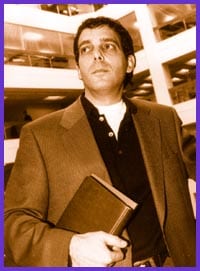Warning patrons that police are at the door could land a bar or bathhouse employee in jail, warns a well-known criminal lawyer.
“If he or she takes a step which is intended to obstruct, all the Crown needs to show is the purpose was to obstruct [police] in the execution of his duties,” says Frank Addario.
So intentionally warning customers of a bust is illegal. And the penalty for obstruction is up to two years in prison.
Bijou cashier Art Whitaker was charged when he flicked the switch in the early hours of Jul 1.
At the time, Whitaker said he checked out the badges, hit the lights and buzzed them in. “I thought they wanted them on, because if they wanted to do an inspection of a licensed premise they would like to see.”
Cops didn’t see it quite that way. The charge was dropped in a general amnesty two months later, with the chief Crown attorney warning that it was a one-time thing.
There’s lots of talk about what bathhouse and bar owners can do to stop the cops from what they see as harassment. But the legalities are messy.
It’s not technically illegal to tell people outside a bathhouse or bar that there’s a raid going on. So when police barge in, then eventually tell someone they can go, that person can blurt out the info to passers-by.
Of course, when that happened in New York, the Stonewall riots that launched the modern gay rights movement ensued.
The first protests in Toronto during the infamous 1981 bathhouse raids began the next day. More police raids in June of ’81 were met with demos the following weekend, which turned violent.
Addario says it’s all a question of intent. Encouraging a riot is illegal. So a – fictional – blue light outside an establishment that warned of a breach could be okay, or could be problematic. It depends how others react.
“Police would look for way to expose the person who flipped the switch with the subsequent conduct,” says Addario.
Back during the ’81 bathhouse riots, Xtra’s predecessor The Body Politic ran photographs of men it identified as plainclothes police officer, even accusing some of encouraging the rioting.
Identifying undercover cops is complicated. “It’s a grey area of the law,” says Addario.
“There is a BC case that the guy was walking around in Gastown in Vancouver, pointing out to all the winos the plainclothes officers….
“They were attempting to arrest the beggars in the ’70s when we had a vagrancy law.”
The good samaritan was convicted.
Even stopping a cop from entering your establishment is hard. Owners of private clubs are entitled to keep out people they don’t want – if they’ve caused trouble in the past, for example. It happens every day in TO.
But you’d need to be completely up to date on every possible reason a cop has to check out your business before you were able to sort out answers to your challenge.
Liquor licence inspections, food or fire checks – all require staff to allow police entry.
Warns Addario: “It’s a treacherous area for the citizen untrained in the law. One needs to be completely familiar with the duties imposed on police by the dozens of statutes that govern the running of commercial establishments.”

 Why you can trust Xtra
Why you can trust Xtra


